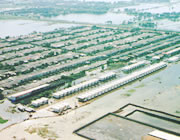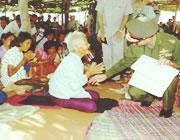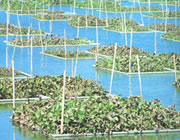In implementing the Royal Development Projects in accordance with His Majesty's initiatives and objectives of the master plan, the following major principles should be taken into consideration:
1. Tackling the immediate problems
His Majesty the King always emphasizes that his projects aim at solving the immediate problems facing the nation as quoted:
"…If you have a headache, you cannot think… So, you must cure or relieve this condition. In fact, the medication used is not a permanent cure. However, we must relieve the headache in order to be in the condition to think. Moreover, I do not agree with the macro method of solving the problem which is based on the concept of overhauling the whole system. For example, we complain that this house is damaged here and there and it is not worthwhile to repair. Therefore, we'd better disassemble the house. In this case, where will we live? Since we have nowhere else to live, we should find some wood to sustain the house and gradually repair the house room by room. The best method is to proceed step by step and not to overhaul the whole system…"

Examples of the projects which focus on handling the immediate problems in an emergency are the development work in the areas within Laharn Sai District, Buri Ram Province on the Thai-Cambodian border which was underdeveloped and under communist control. After the Royal Development Projects reached the area, the security problem decreased and finally resolved. The current cases of tackling the immediate problem approach are such as the traffic congestion and flooding in the Bangkok metropolitan area.
2. Development according to steps, necessity and economy
His Majesty the King emphasizes development work which aims to strengthen the community to the self-supporting level in order to equip the community with a strong foundation prior to future progress. He uses the word “explosion from within” which means the community and village must be strengthened before being exposed to the outside world. The progress from outside should not be brought into a community which is not prepared or made ready. His Majesty wishes to assist his subjects as necessary and appropriate with their status in order to enable them to be self-reliant and to be able to comfortably cope with the outside world as quoted:
“…Development of the nation must be carried out in stages, starting with the laying of the foundation by ensuring that the majority of the people have their basic necessities through the use of economical means and equipment in accordance with theoretical principles. Once a reasonably firm foundation has been laid and in effect, higher levels of economic growth and development should be promoted. If we were to concentrate only on fast economic progress without allowing the plan of operation to harmonize with the conditions of the country and the people, an imbalance in various aspects would be caused and may bring about failure in the end, as witness the serious economic crises currently faced by many developed country…

It is highly important to encourage and help people in earning their living and supporting themselves with adequate means, because those who are gainfully employed and self-supporting are capable of contributing positively towards higher levels of development. As regards the concept of gradual progress with caution and economy, it is to be followed if only in order to prevent failure and ensure certain and complete success…”
3. Self-supporting
Another important principle of the Royal Development Projects is that the Thai people should be encouraged to get along with the society and be “self-supporting” as His Majesty stated:
“…Understanding of the situation facing those whom we want to help is most important. Helping them to acquire the basic needs of life is the most effective means of assistance. Therefore, before giving assistance in each case each time, we must take account of their wants and needs. We must understand the situation they are encountering and decide the means and extent to which they can be helped. Another thing, we should attach to the important principle that we help them in order to enable them to help themselves…”
The examples of the Royal Development Projects which are based on the principle of self-reliance in order to solve the poverty crisis of Thai farmers include the Rice Bank Project, Cattle Bank Project and “Hup Kraphong” Land Management and Development Project at Cha-am District, Phetchaburi Province . These projects are aimed at providing farmers with land to live and cultivate, and encouraging them to form cooperatives in order to solve the occupational as well as other problems in the communities. Furthermore, the recent Royal Development Projects are all intended to enable the Thai people to be self-reliant since they are supporting projects which allow the people to conduct their occupations productively and effectively. Examples of these projects include water sources development, agricultural training and training on supplementary occupation and related techniques.

4. Topographical and sociological approach
Development according to His Majesty the King's initiative must be consistent with the problems of each specific region due to cultural differences. His Majesty used the words
“Topography and Sociology” because he takes into consideration both topographical and sociological characteristics of each region. Modern technology which is not applicable should not be imposed on the farmers. For example, they should not be encouraged to cultivate crops on the mountains or on arid soil which are wrong methods. His Majesty always guides us that every work implementation must be in line with topographical and sociological characteristics of each region as quoted in an excerpt from his speech: "
“…Development must take account of the local environment in terms of the physical environment, the sociological environment and the cultural environment. By the local sociological environment, we mean certain characteristics and ways of thinking which we cannot force people to change. We can only suggest. We cannot go in to help people by trying to make them the same as us. However, if we go in and find out what the people really want and then fully explain how they can best achieve their aims, the principles of development can be fully applied.”
5. Simplicity and economy
In implementing the development work and assisting his subjects, His Majesty the King employs the principle of “nature cures nature” which is applicable but simple, economical and locally-available without having to rely on heavy investment or complicated technology. Dr. Sumet Tantivejkul, former Secretary-General of the Royal Development Projects Board stated:

“His Majesty's methods of solving problems are always simple and based on natural means. If the matter concerns the people's way of living, His Majesty will think of himself as being a farmer and seek solutions to the problems from the point of view of a farmer. He often says, “Never impose on the farmers what they cannot apply.” Sometimes His Majesty's methods are too simple for us to imagine. He said, “I will use evils to fight against evils.” For instance, in the case of water pollution, he suggested the use of water hyacinth and that actually worked. Like in Makkasan swamp, the polluted water has greatly improved in its quality.”
6. Promotion of modern and appropriate knowledge and technology
His Majesty the King believes that modern and appropriate knowledge and technology on agriculture which the farmers lack and need should be promoted. His Majesty stresses the necessity of having “a demonstration model of success” to show the farmers. Because of his wish to allow the farmers the opportunity to observe the model of success and apply it to their occupations, His Majesty initiated the establishment of six “Royal Development Study Centres” (RDSCs) throughout the country. The Centres serve to conduct study, experimentation, and research on modern knowledge and technology which the farmers can understand and apply in their real life. Moreover, the methodology used in these Centres are inexpensive and suitable for the environment and occupations of the local people. When the study and research yield successful results, they will further be disseminated to the farmers. His Majesty wishes that these demonstration models of success be spread all over the country and seriously applied in order to achieve favourable results.
7. Sustainable conservation and development of natural resources
His Majesty the King is immensely interested in conservation and improvement of deteriorated natural resources because the development of the country in the past years emphasized the economic growth resulting in high and fast-growing economic status. The economic structure of Thailand has geared towards an industry-oriented and service-oriented production system. This caused overuse and misuse of the natural resources. Since the destroyed natural resources are not rehabilitated to their original conditions, they are increasingly deteriorating. His Majesty thus gave guidelines for the development and rehabilitation of the natural resources which directly benefit the country's agricultural development. His Majesty favours sustainable development and conservation of the natural resources, coupled with the rehabilitation of the deteriorated natural resources as the foundation of the country's overall development in the long run. He is immensely interested in the improvement of various kinds of natural resources such as forests, land, water sources and aquatic animals so that they may be in a condition which optimizes the efficiency of production.

Consequently, many projects were implemented. These projects included the Watershed Area Conservation Project; the Forest Loves Water Project; the Deteriorated Land Development Project; the Royal-initiated Development and Promotion of the Utilization of the Vetiver Grass Project; the Waste Water Treatment Projects in Bangkok and other major cities based on the use of hyacinth, “Good Water Chases Bad” Theory and the Chaipattana Aerator; as well as the Royal-initiated Laem Phak Bia Environmental Study, Research, and Development Project. The intention is to restore and develop natural resources back to their original state together with equipping the villagers with knowledge in order to be able to use limited natural resources economically and appropriately for optimum long-term benefits which ultimately leads to sustainable development